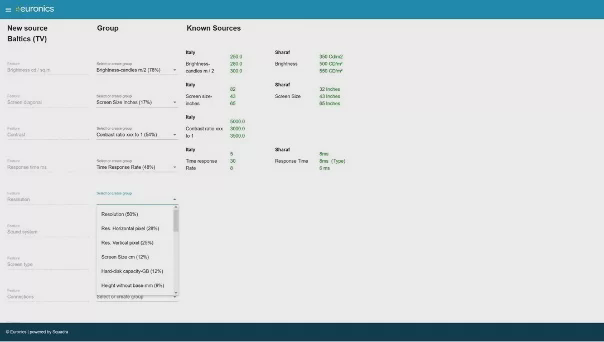Cases
Euronics

- Data set alignment
- Enhanced data quality
- More uniform data model
Euronics is a consortium of companies that sell consumer electronics. They hold a considerable portion of the consumer electronics market, featuring over 11,000 independent retailers across 37 countries, such as Germany and France. While this global presence contributes to Euronics’ prosperity, it also presents certain challenges. The consortium utilizes 19 different Product Information Management (PIM) systems and operates 54 distinct web stores for consumers. This situation can naturally result in discrepancies and gaps in (product) information. To address this, Euronics recognized the potential benefits of consolidating the various product details from their numerous PIM systems, although they were unsure of the precise approach to achieve this.
Challenge
It became evident that certain countries possessed more comprehensive and superior product data for specific items than others. Consequently, the inadequacy in quantity and quality of data in some regions could be supplemented with the more complete data from other locations. To facilitate this, it was necessary to correlate product codes (e.g., EAN, UPS, or GTIN). However, variations in product codes existed across different nations. As a result, data sets were inconsistent between countries, with some exhibiting poor data quality. Thus, the brand needed to devise an alternative solution to address their challenges. This was when Squadra Machine Learning Company stepped in to assist in finding a resolution.
Solution

Squadra Machine Learning Company proposed the idea of linking individual products through a comparison of their attributes. Initially, data sets from three of Euronics’ organizations were compiled, and the features within these sets were aligned. Following that, the features were organized to achieve a clearer overview. Next, a determination was made on whether the EAN, UPS, or GTIN codes, as well as the model numbers, could be matched, and it turned out that only the model numbers could be aligned. Subsequently, the available product features were compared (as shown in the screenshot below). An algorithm was developed based on brand names and product codes. The next phase involved enriching the incomplete data sets with those that were more comprehensive. The resulting tool was designed to provide a similarity score between products. When a new data set is integrated, the similarity score indicates the degree of similarity among sets, along with the capability to enhance the new data set.
Result
Following collaboration with Squadra Machine Learning Company, Euronics has achieved greater consistency across all its organizations. This improvement translates to higher-quality information for customers, and the increased uniformity and data quality enable the brand to appreciate the advantages brought by the consolidated data. Furthermore, it can be seen as a significant step toward further opportunities; with a consistent data model, the brand may gain improved insights into where their products are available. They may also request additional product data from suppliers. By utilizing this information effectively, even more automation possibilities for business processes open up. For instance, based on product features, Powertext.ai can create unique and high-quality product descriptions, which in turn directs customers to the website more effectively. This increased visibility on Google, combined with the greater volume of information provided to customers, may ultimately result in improved conversion rates.
